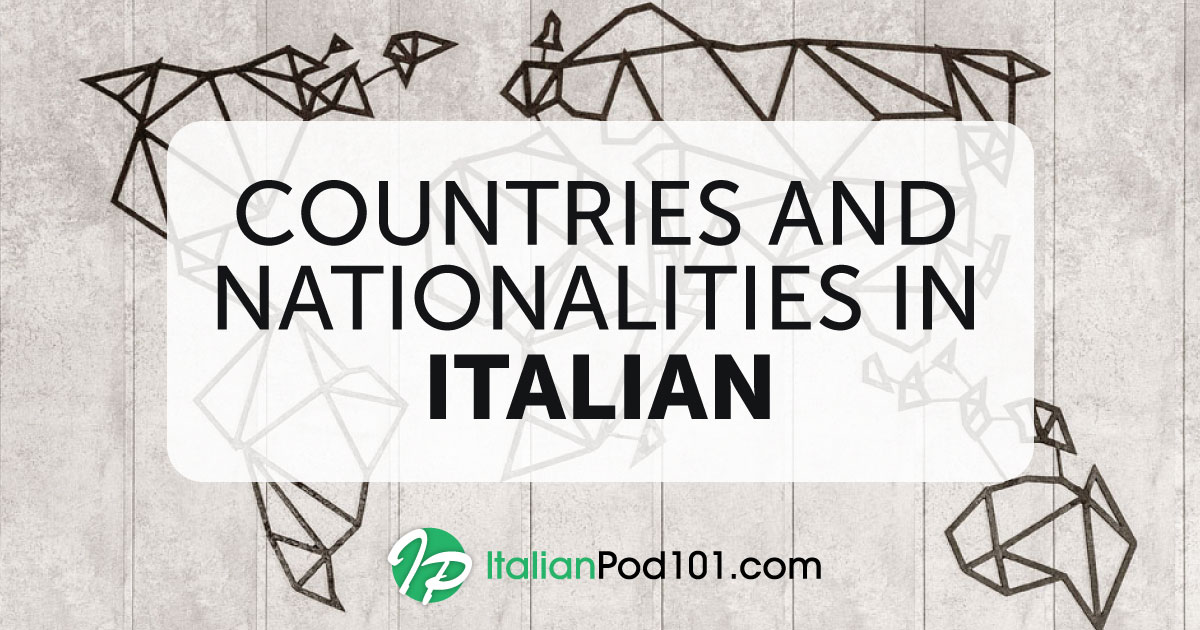
“Adjectives are the sugar of literature and adverbs the salt,” said the great American writer Henry James. So, let’s add some salt to your Italian with this amazing list of the 100+ most common Italian adverbs by ItalianPod101!
 Table of Contents
Table of Contents
- What is an Adverb?
- List of the Most Common Italian Adverbs
- Improve Your Italian While Having Fun with ItalianPod101
1. What is an Adverb?

An adverb is an element in a sentence that can’t be inflected and which modifies the meaning of another element. As in Henry James’ quote, it adds something to a sentence, a nuance that makes it more meaningful and rich.
Let’s see an example:
- Angela was walking back home.
- Angela was tiredly walking back home.
The adverb “tiredly” adds a new layer of meaning to the sentence and clarifies the image we may create of Angela while she was walking back to her house.
Well, now that we’ve convinced you of the importance of Italian adverbs, let’s see our amazing Italian adverbs list.

2. List of the Most Common Italian Adverbs
1 – Italian Adverbs of Time
We start our list with the Italian time adverbs:
- Oggi (“Today”)
- Oggi Marta e Lorenzo si sposano.
“Today, Marta and Lorenzo are getting married.”
- Oggi Marta e Lorenzo si sposano.
- Ieri (“Yesterday”)
- Sono tornato ieri dall’Italia.
“I came back from Italy yesterday.”
- Sono tornato ieri dall’Italia.
- Domani (“Tomorrow”)
- Domani andremo a Roma.
“Tomorrow, we’ll go to Rome.”
- Domani andremo a Roma.
- Presto (“Soon”)
- Spero di vederti presto.
“I hope to see you soon.”
- Spero di vederti presto.
- Tardi (“Late”)
- Elena arriva sempre tardi.
“Elena always arrives late.”
- Elena arriva sempre tardi.
- Prima (“Before”)
- Prima di tornare a casa, sono andato al supermercato.
“Before coming home, I went to the supermarket.”
- Prima di tornare a casa, sono andato al supermercato.
- Dopo (“After”)
- Dopo aver cambiato lavoro, la mia vita è migliorata.
“After I changed my job, my life got better.”
- Dopo aver cambiato lavoro, la mia vita è migliorata.
- Ora (“Now”)
- Ora sono troppo stanca per uscire.
“Now I’m too tired to go out.”
- Ora sono troppo stanca per uscire.
- Stamattina (“This morning”)
- Stamattina Maria si è svegliata molto presto.
“Maria woke up very early this morning.”
- Stamattina Maria si è svegliata molto presto.
- Stasera (“Tonight”)
- Ti va di andare al cinema stasera?
“Would you like to go to the cinema tonight?”
- Ti va di andare al cinema stasera?
- Subito (“Immediately”)
- Giovanni, vieni subito qui!
“Giovanni, come here immediately!”
- Giovanni, vieni subito qui!
- Già (“Already”)
- Ho già visto questo film.
“I’ve already seen this movie.”
- Ho già visto questo film.
- Ancora (“Again,” “Yet”)
- Non ho ancora incontrato la ragazza di mio fratello.
“I haven’t met my brother’s girlfriend yet.”
- Non ho ancora incontrato la ragazza di mio fratello.
- Ormai (“By now,” “Already”)
- Ormai devono essere arrivati a Milano.
“They must have arrived in Milan by now.”
- Ormai devono essere arrivati a Milano.
- Poi (“Then”)
- Siamo andati a fare shopping e poi a cena.
“We went shopping and then to dinner.”
- Siamo andati a fare shopping e poi a cena.

2 – Italian Adverbs of Frequency
Here’s a list of the most common Italian frequency adverbs:
- Mai (“Never”)
- Non sono mai stato in Cina.
“I’ve never been to China.”
- Non sono mai stato in Cina.
- Sempre (“Always”)
- Quando viaggio, porto sempre con me un buon libro.
“When I travel, I always bring a good book with me.”
- Quando viaggio, porto sempre con me un buon libro.
- Spesso (“Often”)
- I miei genitori sono spesso fuori città.
“My parents are often out of town.”
- I miei genitori sono spesso fuori città.
- Raramente (“Rarely”)
- Mangio carne raramente.
“I rarely eat meat.”
- Mangio carne raramente.
- Di solito (“Usually”)
- Di solito il sabato esco con i miei amici.
“I usually go out with my friends on Saturday.”
- Di solito il sabato esco con i miei amici.
- A volte (“Sometimes”)
- A volte mia sorella si alza all’alba e va a correre.
“Sometimes my sister gets up at dawn and goes jogging.”
- A volte mia sorella si alza all’alba e va a correre.
- Costantemente (“Constantly”)
- Luigi controlla costantemente il cellulare.
“Luigi constantly checks his mobile phone.”
- Luigi controlla costantemente il cellulare.
3 – Italian Adverbs of Place
- Qui (“Here”)
- Potremmo fermarci qui e fare un pic nic.
“We could stop here and have a picnic.”
- Potremmo fermarci qui e fare un pic nic.
- Là (“There”)
- Non andare là!
“Don’t go there!”
- Non andare là!
- Lì (“There”)
- Vorrei andare lì domani.
“Tomorrow, I’d like to go there.”
- Vorrei andare lì domani.
- Ovunque (“Wherever”)
- Il mio cane mi segue ovunque io vada.
“My dog follows me wherever I go.”
- Il mio cane mi segue ovunque io vada.
- Dappertutto (“Everywhere”)
- Ho cercato le chiavi dappertutto, ma non le trovo.
“I looked for the keys everywhere, but I can’t find them.”
- Ho cercato le chiavi dappertutto, ma non le trovo.
- Dentro (“Inside”)
- Il sale è dentro la dispensa.
“Salt is inside the pantry.”
- Il sale è dentro la dispensa.
- Fuori (“Outside”)
- Per favore, vai a fumare fuori.
“Please, go smoke outside.”
- Per favore, vai a fumare fuori.
- Giù (“Down,” “Below”)
- Maria è scesa giù al primo piano.
“Maria went down to the first floor.”
- Maria è scesa giù al primo piano.
- Su (“Up”)
- Guarda su, il cielo è bellissimo.
“Look up, the sky is beautiful.”
- Guarda su, il cielo è bellissimo.
- Lassù (“Up there”)
- Lassù c’è un bellissimo castello.
“There’s a beautiful castle up there.”
- Lassù c’è un bellissimo castello.
- Laggiù (“Down there”)
- Laggiù c’è un ottimo ristorante.
“There’s a great restaurant down there.”
- Laggiù c’è un ottimo ristorante.
- Sopra (“Above”)
- Sopra il tavolo c’è un vaso.
“Above the table, there’s a vase.”
- Sopra il tavolo c’è un vaso.
- Sotto (“Below”)
- Sotto il tavolo c’è il gatto.
“Below the table, there’s the cat.”
- Sotto il tavolo c’è il gatto.
- Vicino (“Nearby”)
- Ho parcheggiato vicino.
“I’ve parked nearby.”
- Ho parcheggiato vicino.
- Lontano (“Far away”)
- Matteo si è trasferito lontano, in un’altra città.
“Matteo has moved far away, in another city.”
- Matteo si è trasferito lontano, in un’altra città.
- Intorno (“Around”)
- C’è un bel giardino intorno alla casa.
“There’s a nice garden around the house.”
- C’è un bel giardino intorno alla casa.
- Altrove (“Somewhere else”)
- In questo momento vorrei tanto essere altrove.
“At this moment, I’d really like to be somewhere else.”
- In questo momento vorrei tanto essere altrove.
- Davanti (“In front of”)
- Di fronte alla chiesa c’è un bel caffè.
“There’s a nice café in front of the church.”
- Di fronte alla chiesa c’è un bel caffè.
- Dietro (“Behind,” “Back”)
- Si è nascosto dietro la tenda.
“He hid behind the curtain.”
- Si è nascosto dietro la tenda.
- Ci (“There”) [also used as a desinence]
- Mi farebbe molto piacere esserci.
“I’d really like to be there.”
- Mi farebbe molto piacere esserci.
- Vi (“There”) [also used as a desinence]
- Vi si trova un grande anfiteatro romano.
“There is a great Roman amphitheater.”
- Vi si trova un grande anfiteatro romano.
- Ne (“[Away] from there/here”)
- Se ne sono andati da due ore.
“They went away two hours ago.”
- Se ne sono andati da due ore.
- Via (“Away”)
- È tardi, andiamo via.
“It’s late, let’s go away.”
- È tardi, andiamo via.

4 – Italian Adverbs of Manner
A tip: You can turn many Italian adjectives into adverbs of manner by adding –mente to feminine adjectives, which is a pattern you’ll notice often in this section. But it doesn’t always work. For example, you can’t turn cattivo into an adverb by simply adding –mente.
The most important Italian adverbs of manner are:
- Lentamente (“Slowly”)
- Il latte caldo va bevuto lentamente.
“Hot milk must be drunk slowly.”
- Il latte caldo va bevuto lentamente.
- Velocemente (“Quickly”)
- Ho mangiato velocemente e sono tornato al lavoro.
“I ate quickly and got back to work.”
- Ho mangiato velocemente e sono tornato al lavoro.
- Attentamente (“Carefully”)
- Ascolta attentamente quello che dico.
“Listen carefully to what I say.”
- Ascolta attentamente quello che dico.
- Facilmente (“Easily”)
- Lucia ha passato l’esame facilmente.
“Lucia easily passed the exam.”
- Lucia ha passato l’esame facilmente.
- Semplicemente (“Simply”)
- Ho semplicemente detto di sì alla sua offerta.
“I simply said yes to his offer.”
- Ho semplicemente detto di sì alla sua offerta.
- Dolcemente (“Sweetly”)
- La baciò dolcemente sulle labbra.
“He sweetly kissed her on her lips.”
- La baciò dolcemente sulle labbra.
- Tranquillamente (“Calmly”)
- Un uomo cammina tranquillamente sulla spiaggia.
“A man calmly walks on the beach.”
- Un uomo cammina tranquillamente sulla spiaggia.
- Perfettamente (“Perfectly”)
- Questo vestito ti sta perfettamente.
“This dress fits you perfectly.”
- Questo vestito ti sta perfettamente.
- Bene (“Well”)
- La presentazione è andata molto bene.
“The presentation went very well.”
- La presentazione è andata molto bene.
- Male (“Badly,” “Rudely”)
- Monica ha risposto male a sua madre.
“Monica responded rudely to her mother.”
- Monica ha risposto male a sua madre.
- Chiaramente (“Clearly”)
- Il professore ha spiegato tutto molto chiaramente.
“The professor explained everything very clearly.”
- Il professore ha spiegato tutto molto chiaramente.
- Letteralmente (“Literally”)
- Sono letteralmente senza parole.
“I’m literally out of words.”
- Sono letteralmente senza parole.
- Onestamente (“Honestly”)
- Onestamente, non so di cosa stai parlando.
“Honestly, I don’t know what you’re talking about.”
- Onestamente, non so di cosa stai parlando.
- Gentilmente (“Gently”)
- La neve cominciò gentilmente a cadere.
“Snow started gently to fall.”
- La neve cominciò gentilmente a cadere.
- Bruscamente (“Abruptly”)
- L’auto frenò bruscamente.
“The car broke abruptly.”
- L’auto frenò bruscamente.
- Improvvisamente (“Suddenly”)
- Improvvisamente è spuntato il sole.
“Suddenly, the sun came out.”
- Improvvisamente è spuntato il sole.
- Freddamente (“Coldly”)
- Ci accolsero freddamente.
“They received us coldly.”
- Ci accolsero freddamente.
- Calorosamente (“Warmly”)
- Ci siamo salutati calorosamente e siamo partiti.
“We said goodbye warmly and left.”
- Ci siamo salutati calorosamente e siamo partiti.
- Correttamente (“Correctly,” “Properly”)
- Sul lavoro si è sempre comportato correttamente.
“At work, he’s always behaved properly.”
- Sul lavoro si è sempre comportato correttamente.
- Duramente (“Hardly,” “Hard”)
- Ho lavorato duramente per la mia carriera.
“I worked hard for my career.”
- Ho lavorato duramente per la mia carriera.
- Volentieri (“Gladly”)
- Sarei venuto con voi volentieri, ma non potevo.
“I would have come with you gladly, but I couldn’t.”
- Sarei venuto con voi volentieri, ma non potevo.
- Forte (“Strongly,” “Quickly”)
- Federica correva forte incontro a suo padre.
“Federica was running quickly toward her father.”
- Federica correva forte incontro a suo padre.

5 – Italian Adverbs of Degree or Addition
- Molto (“Much”)
- Il film non mi è piaciuto molto.
“I didn’t like the film much.”
- Il film non mi è piaciuto molto.
- Poco (“Little”)
- A cena ho mangiato poco.
“At dinner, I ate little.”
- A cena ho mangiato poco.
- Troppo (“Too much”)
- Stamattina ho dormito troppo.
“I slept too much this morning.”
- Stamattina ho dormito troppo.
- Piuttosto (“Quite,” “Rather”)
- I mobili sono piuttosto belli, ma vecchi.
“The furniture is quite nice, but old.”
- I mobili sono piuttosto belli, ma vecchi.
- Abbastanza (“Quite,” “Sufficiently”)
- Maria è abbastanza soddisfatta del nuovo lavoro.
“Maria is quite satisfied with her new job.”
- Maria è abbastanza soddisfatta del nuovo lavoro.
- Più (“More,” “Most”)
- Matteo è più bello di Antonio.
“Matteo is more handsome than Antonio.”
- Matteo è più bello di Antonio.
- Meno (“Less”)
- Camminiamo meno di un tempo.
“We walk less than (what we used to do) once.”
- Camminiamo meno di un tempo.
- Meglio (“Better”)
- Oggi mia nonna si sente meglio.
“Today, my grandmother is feeling better.”
- Oggi mia nonna si sente meglio.
- Peggio (“Worse”)
- L’esame era difficile, ma pensavo peggio.
“The exam was difficult, but I thought it was worse.”
- L’esame era difficile, ma pensavo peggio.
- Moltissimo (“Very much”)
- La cena mi è piaciuta moltissimo.
“I liked the dinner very much.”
- La cena mi è piaciuta moltissimo.
- Pochissimo (“Very little”)
- Mio cugino guadagna pochissimo.
“My cousin earns very little.”
- Mio cugino guadagna pochissimo.
- Come (“How,” “Like,” “As much as”)
- Paolo è come un fratello per me.
“Paolo is like a brother to me.”
- Paolo è come un fratello per me.
- Inoltre (“Moreover”)
- Volevo dirti, inoltre, che abbiamo finito lo zucchero.
“I wanted to tell you, moreover, that we’re out of sugar.”
- Volevo dirti, inoltre, che abbiamo finito lo zucchero.
- Pure (“Also,” “Too”)
- Vorrebbe venire pure Flavia, va bene?
“Flavia would like to come too, is it okay?”
- Vorrebbe venire pure Flavia, va bene?
- Persino (“Even”)
- Persino mio figlio si è divertito.
“Even my son had a great time.”
- Persino mio figlio si è divertito.
- Addirittura (“Even”)
- Era così freddo che siamo addirittura partiti prima della fine del concerto.
“It was so cold that we even left before the end of the concert.”
- Era così freddo che siamo addirittura partiti prima della fine del concerto.

6 – Italian Question Adverbs
- Dove (“Where”)
- Dov’è andata Gianna?
“Where did Gianna go?”
- Dov’è andata Gianna?
- Quando (“When”)
- Quando tornerai dagli Stati Uniti?
“When will you come back from the United States?”
- Quando tornerai dagli Stati Uniti?
- Come (“How”)
- Come ti senti oggi?
“How are you feeling today?”
- Come ti senti oggi?
- Perché (“Why”)
- Perché non ci raggiungete più tardi?
“Why don’t you join us later?”
- Perché non ci raggiungete più tardi?
7 – Italian Adverbs of Exclamation
- Come (used to emphasize a sentence)
- Come sono felice di vederti!
“I’m so happy to see you!”
- Come sono felice di vederti!
- Quanto (used to emphasize a sentence)
- Quanto mi manchi!
“I miss you so much!”
- Quanto mi manchi!
8 – Italian Adverbs of Affirmation, Negation, and Doubt
- Sì (“Yes”)
- Sì, mi piacerebbe venire a cena con te.
“Yes, I’d like to go to dinner with you.”
- Sì, mi piacerebbe venire a cena con te.
- Certo (“Of course”)
- Certo, ormai è troppo tardi.
“Of course, now it’s too late.”
- Certo, ormai è troppo tardi.
- Davvero (“Really”)
- Ho davvero voglia di un gelato.
“I’d really like an icecream.”
- Ho davvero voglia di un gelato.
- Sicuramente (“For sure”)
- Io e mio marito ci saremo sicuramente.
“My husband and I will be there for sure.”
- Io e mio marito ci saremo sicuramente.
- Proprio (“Really”)
- Sono proprio contento che siate venuti a trovarmi.
“I’m really happy that you went to see me.”
- Sono proprio contento che siate venuti a trovarmi.
- No (“No”)
- A: Vieni con noi?
B: No, sono stanco.
A: “Will you come with us?”
B: “No, I’m tired.”
- A: Vieni con noi?
- Non (“Not”)
- Giorgio non è andato a scuola oggi.
“Giorgio didn’t go to school today.”
- Giorgio non è andato a scuola oggi.
- Nemmeno (“Even [negative],” “Neither,” “Not even”)
- Nemmeno io sopporto quella donna.
“Even I can’t stand that woman.”
- Nemmeno io sopporto quella donna.
- Affatto (“At all”)
- Questo vino non mi piace affatto.
“I don’t like this wine at all.”
- Questo vino non mi piace affatto.
- Forse (“Maybe”)
- Forse stasera sono libera.
“Maybe tonight I’m free.”
- Forse stasera sono libera.
- Probabilmente (“Probably”)
- Probabilmente alla festa ci sarà anche Mauro.
“Mauro will probably be at the party, too.”
- Probabilmente alla festa ci sarà anche Mauro.
3. Improve Your Italian While Having Fun with ItalianPod101

We hope you enjoyed learning about Italian adverbs with us, and that you learned some new words for your next conversation! Are there any adverbs we missed that you want to know? Let us know in the comments, and we’ll do our best to help you out!
ItalianPod101.com is an extensive source for everything Italian, including amazing word lists, comprehensive blog posts (like our articles about Italian adjectives and nouns), apps, video lessons, and everything you need to improve your knowledge of this fascinating language. And learning with us is so fun that you won’t ever feel tired! Check out our courses, find Italian adverbs exercises and in-depth lessons, and start on the road to fluency.










